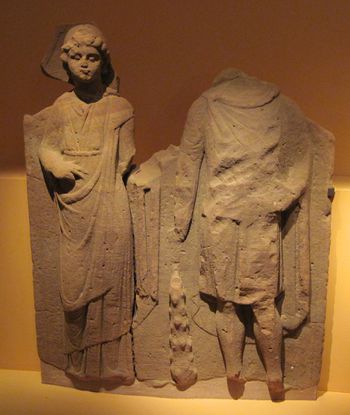「アンカンマ」の版間の差分
| 3行目: | 3行目: | ||
[[Inciona]] is also apparently invoked along with Lenus Mars [[Veraudunus]] on a bronze ''ex voto'' from Luxembourg;<ref name="MNHA">Musée d'histoire et d'art, Luxembourg. 1974. ''Pierres sculptées et inscriptions de l'époque romaine'', catalogued by Eugénie Wilhelm, p.71. {{in lang|fr}}</ref> it is unclear what connection, if any, exists between Inciona and Ancamna. Jufer and Luginbühl link Ancamna with two other consorts of the Gaulish Mars, [[Litavis]] and [[Nemetona]], noting that none of these appear to be warrior goddesses themselves; instead, they suggest that Ancamna might have been associated with a [[spring (hydrosphere)|spring]].<ref name="Jufer"/> Edith Wightman considers the couple Mars [[Loucetius]] and [[Nemetona]] to be "closely similar to if not identical with, Lenus and Ancamna".{{sfnp|Wightman|1970|page=219}} | [[Inciona]] is also apparently invoked along with Lenus Mars [[Veraudunus]] on a bronze ''ex voto'' from Luxembourg;<ref name="MNHA">Musée d'histoire et d'art, Luxembourg. 1974. ''Pierres sculptées et inscriptions de l'époque romaine'', catalogued by Eugénie Wilhelm, p.71. {{in lang|fr}}</ref> it is unclear what connection, if any, exists between Inciona and Ancamna. Jufer and Luginbühl link Ancamna with two other consorts of the Gaulish Mars, [[Litavis]] and [[Nemetona]], noting that none of these appear to be warrior goddesses themselves; instead, they suggest that Ancamna might have been associated with a [[spring (hydrosphere)|spring]].<ref name="Jufer"/> Edith Wightman considers the couple Mars [[Loucetius]] and [[Nemetona]] to be "closely similar to if not identical with, Lenus and Ancamna".{{sfnp|Wightman|1970|page=219}} | ||
| + | |||
| + | == 私的注釈 == | ||
| + | アンカンマとは名前の子音構成から、ギリシア神話のアルクメーネーに相当するのではないだろうか。 | ||
==Works cited== | ==Works cited== | ||
2022年12月9日 (金) 17:21時点における版
In Gallo-Roman religion, Ancamna was a goddess worshipped particularly in the valley of the river Moselle. She was commemorated at Trier and Ripsdorf as the consort of Lenus Mars,[1] and at Möhn as the consort of Mars Smertulitanus.[2][3] At Trier, altars were set up in honour of Lenus Mars, Ancamna and the genii of various pagi of the Treveri, giving the impression of Lenus Mars and Ancamna as tribal protectors honoured in an officially organized cult.テンプレート:Sfnp[4] Among the few statuettes left as votive offerings at the sanctuary of Mars Smertulitanus and Ancamna at Möhn is one of a genius cucullatus like those offered to the Xulsigiae at the Lenus Mars temple complex in Trier.テンプレート:Sfnp
Inciona is also apparently invoked along with Lenus Mars Veraudunus on a bronze ex voto from Luxembourg;[5] it is unclear what connection, if any, exists between Inciona and Ancamna. Jufer and Luginbühl link Ancamna with two other consorts of the Gaulish Mars, Litavis and Nemetona, noting that none of these appear to be warrior goddesses themselves; instead, they suggest that Ancamna might have been associated with a spring.[3] Edith Wightman considers the couple Mars Loucetius and Nemetona to be "closely similar to if not identical with, Lenus and Ancamna".テンプレート:Sfnp
私的注釈
アンカンマとは名前の子音構成から、ギリシア神話のアルクメーネーに相当するのではないだろうか。
Works cited
Further reading
- Ellis, Peter Berresford (1994). Dictionary of Celtic Mythology (Oxford Paperback Reference), Oxford University Press, Oxford. ISBN 0-19-508961-8
- MacKillop, James (1998). Dictionary of Celtic Mythology. Oxford University Press, Oxford. ISBN 0-19-280120-1.
- テンプレート:Cite book
- Wood, Juliette (2002). The Celts: Life, Myth, and Art. Thorsons Publishers. ISBN 0-00-764059-5
External links
参照
- ↑ H. Finke (1927). "Neue Inschriften," Bericht der Römisch-Germanischen Kommission 17, inscriptions 12 (= テンプレート:AE), 13 (= EDCS-11201739), 20 (= テンプレート:AE), 254 (= テンプレート:CIL).
- ↑ テンプレート:CIL.
- ↑ 3.0 3.1 Nicole Jufer & Thierry Luginbühl. 2001. Les dieux gaulois : répertoire des noms de divinités celtiques connus par l'épigraphie, les textes antiques et la toponymie. Editions Errance, Paris. pp.14, 21. テンプレート:In lang
- ↑ Two such surviving inscriptions were published in Finke (1927) "Neue Inschriften," Bericht der Römisch-Germanischen Kommission 17: inscriptions 12 and 13.
- ↑ Musée d'histoire et d'art, Luxembourg. 1974. Pierres sculptées et inscriptions de l'époque romaine, catalogued by Eugénie Wilhelm, p.71. テンプレート:In lang
